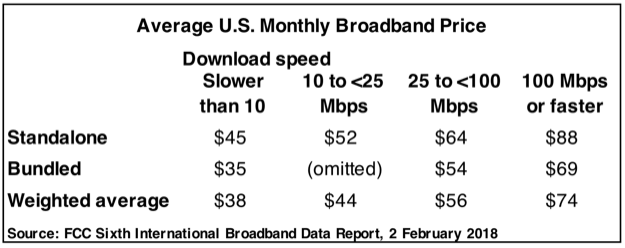
The U.S. is in the bottom half of the broadband price league table, according to a report by the Federal Communications Commission. It was published last February, but I just unearthed it and had a chance to take a hard look at the numbers. When you take both standalone and bundled Internet service packages into account, and weight it by the FCC’s market share figures of 25% standalone and 75% bundled subscriptions, the average monthly price ranges from $38 per month to $74 per month, depending on speed.
As you can see from the table above, bundled prices are noticeably cheaper than standalone rates. That implies that broadband service is significantly more expensive in rural areas, where bundle-happy cable operators do not go and expensive Internet-only wireless providers are common.
The FCC used three methods to compare broadband prices in the U.S. to other developed countries. Two were relatively straightforward comparisons, that show that broadband costs more in the U.S. than in most of the other countries studied…
For fixed broadband prices, under the first method comparing unweighted average prices, the United States ranks 18th out of 23 countries that offer fixed standalone broadband plans with download speeds of at least 25 Mbps and less than 100 Mbps, and 26th out of 28 countries that have fixed standalone plans with download speeds of 100 Mbps or greater. When taking into account fixed broadband bundled with video service, the United States ranks 10th out of 20 countries with download speeds of at least 25 Mbps and less than 100 Mbps. For the highest speed bundle plans with download speeds of 100 Mbps or greater, fixed broadband in the United States ranks 23rd out of 25 countries that offer such plans. Using the second approach, the fixed broadband price index analysis, the United States ranks 21st out of 29 countries aggregating both standalone and bundled broadband products.
The third method – a more complicated regression analysis – bumped the U.S. up the charts to number 7. It tries to account for cost differences between countries, and reckons that because customers have so much more online content available in the U.S., broadband is really cheaper because it’s worth so much. Or something like that. On a cash out of pocket basis, it’s still expensive, though.
